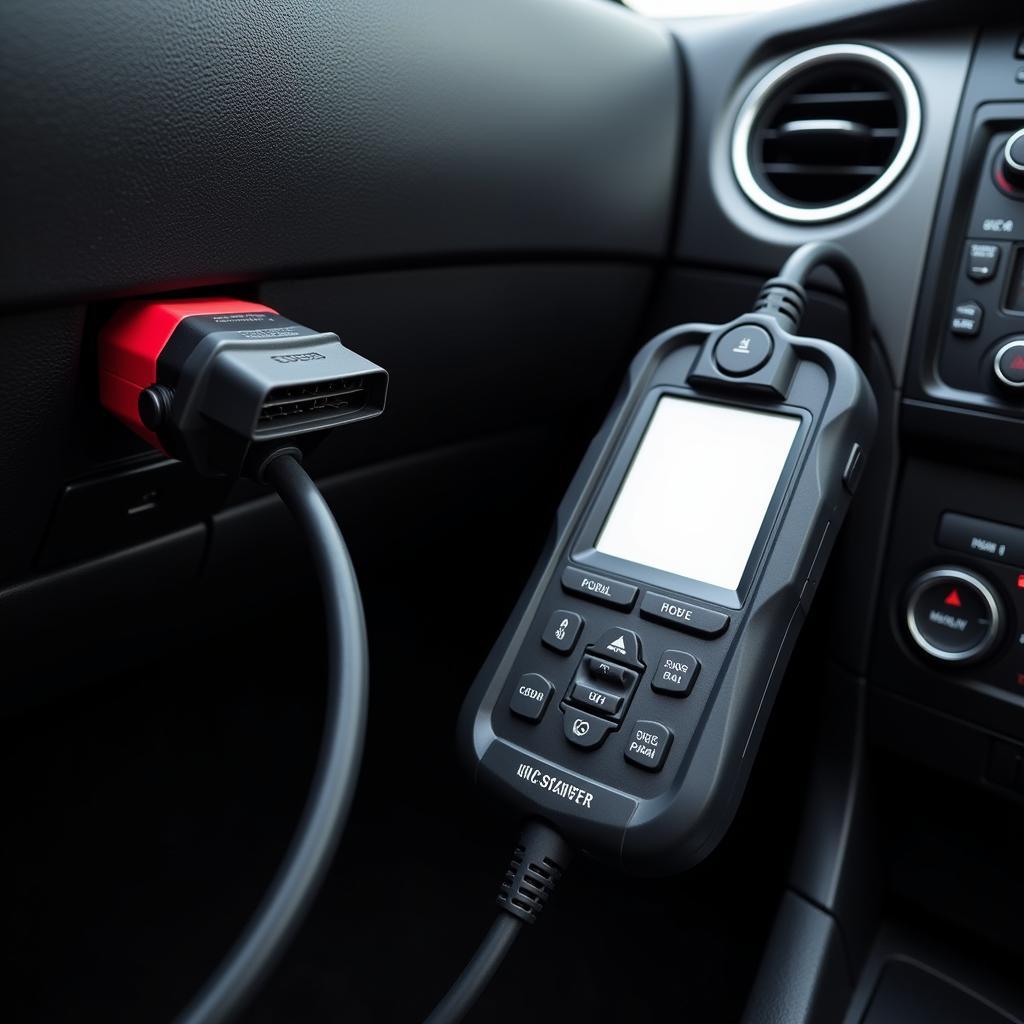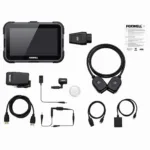When you plug your OBD2 scanner into your car’s OBD2 port and the scanner fails to power up or establish communication with the vehicle’s computer, you might be facing the dreaded “OBD2 do not flash plug” issue. This essentially means your scanner is not receiving power or can’t communicate with your car’s computer, preventing it from reading any diagnostic trouble codes. Don’t panic – this is a common problem with several potential causes, most of which are relatively simple to diagnose and fix.
Common Causes of an OBD2 Do Not Flash Plug Issue
Several culprits could be responsible for your OBD2 scanner not flashing. Here are some of the most common:
1. Blown Fuse
The most common reason for an OBD2 scanner not powering up is a blown fuse in your vehicle’s fuse box. The fuse box is usually located under the dashboard or in the engine bay. Consult your vehicle’s owner’s manual to locate the specific fuse related to the OBD2 port.
2. Faulty OBD2 Port
Over time, the OBD2 port can accumulate dust, dirt, or debris, obstructing the connection between the scanner and the port. A damaged or loose OBD2 port can also cause communication issues.
3. Damaged OBD2 Scanner Cable
A frayed, cut, or damaged OBD2 scanner cable can disrupt the flow of power and data, leading to the “OBD2 do not flash plug” problem.
4. Bad Ground Connection
A poor ground connection between the vehicle’s battery and the OBD2 port can prevent the scanner from receiving power.
5. Software or Firmware Issues
In rare cases, outdated or corrupted software or firmware in your OBD2 scanner can prevent it from communicating with your vehicle’s computer.
How to Fix an OBD2 Do Not Flash Plug Issue
Now that you know the potential causes, let’s explore some solutions to get your OBD2 scanner up and running:
1. Check and Replace the Fuse
- Locate your vehicle’s fuse box using the owner’s manual.
- Identify the fuse associated with the OBD2 port.
- Visually inspect the fuse for any signs of damage or a blown filament.
- If the fuse appears blown, replace it with a new one of the same amperage.
2. Inspect and Clean the OBD2 Port
- Use a flashlight to inspect the OBD2 port for any dirt, debris, or damage.
- Use compressed air or a cotton swab dipped in rubbing alcohol to clean the port gently.
- Ensure the metal pins inside the port are straight and undamaged.
3. Examine the OBD2 Scanner Cable
- Carefully examine the OBD2 scanner cable for any visible damage like cuts, frays, or exposed wires.
- If you find any damage, replace the cable with a new one.
- Ensure the cable is securely connected to both the scanner and the OBD2 port.
4. Verify the Ground Connection
- Consult your vehicle’s repair manual to locate the ground wire for the OBD2 port.
- Check if the ground wire is securely connected to a clean, unpainted metal surface on the vehicle’s chassis.
- If the connection appears loose or corroded, tighten it or clean the contact points.
5. Update Scanner Software/Firmware
- Connect your OBD2 scanner to your computer using the provided USB cable.
- Visit the manufacturer’s website and download the latest software or firmware update for your scanner model.
- Follow the manufacturer’s instructions to install the update on your scanner.
When to Consult a Professional
If you’ve tried all the troubleshooting steps and your OBD2 scanner still won’t flash, it might be time to consult a qualified mechanic. They have the expertise and tools to diagnose more complex electrical issues and ensure your vehicle’s OBD2 system is functioning correctly.
OBD2 Do Not Flash Plug: Frequently Asked Questions
1. Can I use any fuse to replace a blown OBD2 port fuse?
No, it’s crucial to use a fuse with the same amperage rating as the original. Using a fuse with a different amperage can damage your vehicle’s electrical system.
2. Why is my OBD2 scanner working intermittently?
Intermittent issues could indicate a loose connection in the OBD2 port, a faulty OBD2 scanner cable, or a problem with the vehicle’s wiring harness.
3. Can a dead car battery cause the “OBD2 do not flash plug” issue?
Yes, a completely dead battery won’t provide any power to the OBD2 port. However, if the battery has some charge, the scanner might still power up but fail to communicate due to low voltage.
4. Can I drive my car with a blown OBD2 port fuse?
While driving with a blown OBD2 port fuse might not immediately disable your car, it’s not recommended. It prevents the scanner from communicating with your car’s computer, potentially masking underlying issues and preventing proper diagnostics.
5. Does the “OBD2 do not flash plug” problem apply to all OBD2 scanners?
Yes, this issue can affect any OBD2 scanner, regardless of brand or model, as it stems from a lack of power or communication between the scanner and the vehicle’s computer.
Need More Help with Your OBD2 Scanner?
If you’re still experiencing problems with your OBD2 scanner or need assistance with reading and understanding diagnostic trouble codes, don’t hesitate to reach out to our team of automotive experts. We’re available 24/7 to provide you with the support you need to get your car back on the road. You can reach us via WhatsApp: +1(641)206-8880, Email: [email protected].
You may also find these articles helpful:
Remember, a properly functioning OBD2 scanner is an essential tool for diagnosing and resolving car problems, saving you time, money, and potential headaches on the road.


